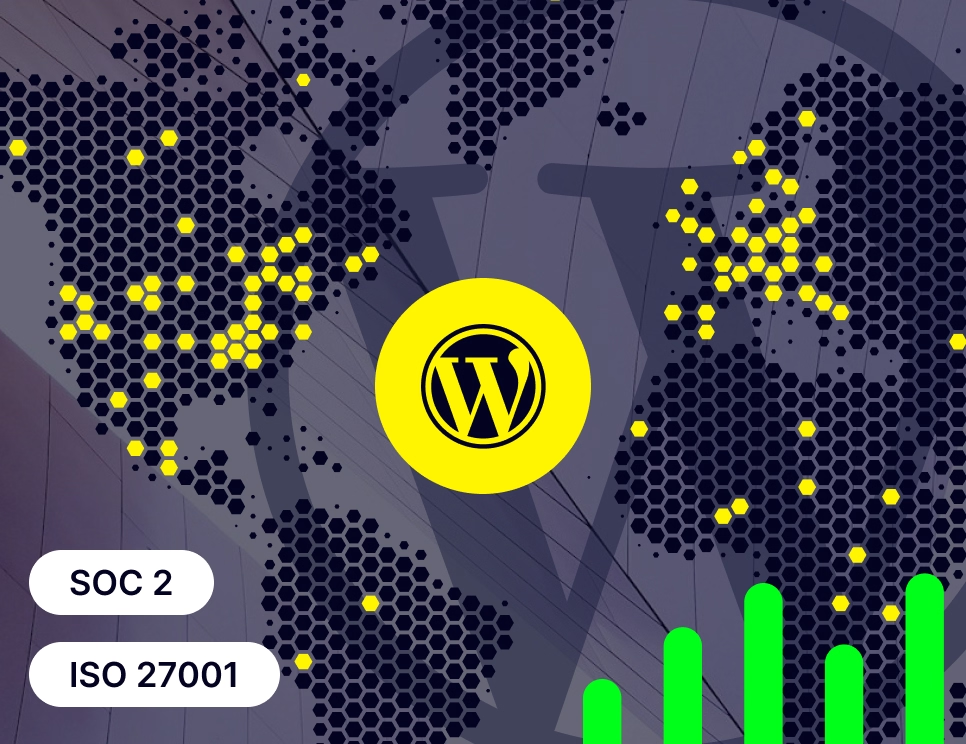Is WordPress a Good Choice for Enterprise?
Websites are often the primary driver of brand visibility, customer engagement, and revenue for enterprise organisations. Choosing the right CMS is, therefore, a critical decision.
WordPress is a world-leading enterprise platform that powers 43% of the web. Its flexibility, scalability, and cost-efficiency make it a top choice for large-scale businesses seeking a digital solution that ticks all of the right boxes.
Yet, many enterprise teams overlook WordPress for proprietary systems. Is that the right choice?
We’ll break down some of the key benefits and possible risks of using WordPress as an enterprise CMS in the guide below.

Harry Hammett is a detail-driven Project Co-Ordinator at Itineris, ensuring seamless delivery across digital projects. With a keen eye for organisation and efficiency, he keeps teams aligned and clients informed, driving success through clear communication and meticulous planning.
Synopsis
- Flexibility and enterprise-grade performance: WordPress combines open-source freedom with enterprise-level security, scalability, and customisation, allowing organisations to build tailored, high-performing digital ecosystems that rival proprietary CMS platforms.
- Lower total cost of ownership and talent availability: With no licensing fees, a vast developer ecosystem, and a wealth of plugins and integrations, WordPress reduces operational costs while giving enterprises access to experienced talent for development, maintenance, and optimisation.
- Trusted by global enterprises: Leading brands such as Zoom, Indeed, Red Bull, and Salesforce rely on WordPress to power their large-scale websites.
Table of Contents
Choosing an Enterprise CMS
Choosing the right enterprise CMS is about more than just managing content. It’s about ensuring the entire digital ecosystem can scale, adapt, and perform under pressure.
Enterprises need a platform that balances flexibility with governance, supports seamless integration with marketing and business systems, and delivers the reliability required for large-scale operations.
Security, performance, and total cost of ownership are also key factors, alongside the ability to empower non-technical teams to create and publish content quickly.
Hesitations With WordPress for Enterprise
Considering 28% of the top 1 million websites rely on WordPress, the platform is clearly well-equipped to manage an enterprise web presence of any size.
Yet, like any digital platform, WordPress might come with its share of concerns — particularly when comparing it against proprietary enterprise CMS platforms. However, most of these “risks” are less structural flaws and more a matter of implementation, governance, and platform management. In fact, with the right setup, many of these perceived limitations can become strengths.
Here are some of the main reasons why enterprise teams may be hesitant to implement WordPress.
1. Open Source Governance and Control
WordPress is open-source at its core, maintained by a global community of contributors. For enterprises, the concern often lies in how this openness is governed. Some might be concerned that this creates uncertainty around the future direction of the platform.
WordPress’s open-source nature is one of its greatest advantages. Unlike proprietary systems, there’s no vendor lock-in, and organisations are free to host, extend, and customise the platform as they see fit.
Enterprises can also reduce reliance on third parties by partnering with specialist agencies or adopting WordPress VIP, which provides enterprise-grade hosting, governance, and support.
2. Security and Vulnerabilities
Security is often raised as the biggest hesitation with WordPress, particularly because it is the world’s most widely used CMS. Its popularity makes it a bigger target for attacks, and poor plugin management can increase risks.
Security issues typically arise from mismanagement, not from the WordPress core, which undergoes rigorous security reviews and regular patches. In fact, 96% of WordPress vulnerabilities come from plugins and themes, not the core platform.
By applying enterprise best practices, enterprises can achieve a level of security that is equal to or stronger than proprietary CMS platforms.
3. Plugin Dependency
With more than 59,000 plugins available, WordPress offers unparalleled flexibility. However, relying too heavily on third-party plugins can introduce bloat, compatibility issues, and support challenges.
4. Enterprise Feature Set
Out of the box, WordPress was designed as a blogging platform — not an enterprise CMS. Features such as advanced workflow approvals, audit trails, or granular permissions may need to be configured or extended.
WordPress has matured far beyond its origins. Through the Gutenberg block editor, REST API, and headless CMS capabilities, enterprises can create sophisticated digital ecosystems that rival (and often outperform) traditional enterprise CMS solutions. Audit logs, workflow management, multilingual content, and even personalisation can all be integrated through enterprise-level plugins or custom solutions.
The flexibility of WordPress ensures that businesses can tailor the CMS precisely to their organisational needs, without being restricted by the limitations of a proprietary platform.
5. Maintenance and Performance
Another common hesitation is that WordPress requires ongoing maintenance to ensure performance, compatibility, and security. This can feel resource-heavy compared to vendor-managed enterprise systems.

Why Choose WordPress for Enterprise?
When you get past any initial hesitations, WordPress is one of the most flexible, scalable, and reliable CMS options for enterprise websites.
Here are the major reasons why enterprise teams choose it.
Open Source Freedom and Flexibility
Unlike proprietary CMS platforms that lock you into licensing models and vendor roadmaps, WordPress is open source. The major advantage is that this gives enterprises full ownership and control. This freedom enables:
- Customisation at scale: Organisations can build unique features or integrations tailored to their business needs.
- Avoiding vendor lock-in: You’re never tied to a single provider’s pricing structure or update schedule.
- Endless innovation opportunities: Development teams can create, extend, or modify capabilities without waiting for a vendor release.
Security at Enterprise Standard
As addressed above, security is understandably a top concern for enterprises. The average cost of a data breach is around $4.4 million, which makes strong security non-negotiable.
Ultimately, the strength of your WordPress security comes down to how well you manage your platform. You have flexibility here, and can harden your WordPress site to the absolute highest enterprise standards.
In a sense, WordPress also addresses security concerns with its open-source model, which means thousands of developers worldwide review and harden code.
Then there are enterprise solutions like WordPress VIP or leading managed hosts, that provide SOC 2, ISO 27001, and GDPR-compliant infrastructure. If you take security seriously, and manage it carefully, WordPress should not present any gaps.
Scalable to Any Level of Demand
WordPress can scale to millions of visitors daily without compromising performance. This is why high-traffic publishers like TechCrunch and global corporations like Zoom rely on WordPress to power their sites.
While proprietary enterprise CMS platforms are built for high-traffic out of the box, they do not have the flexibility that WordPress offers. When set up with the right hosting provider, there is no limit to the level of demand that WordPress can handle.
Some of the key areas that enterprises benefit from include:
- Flexible architecture: Support for multisite, multilingual, and headless CMS configurations.
- Empowered teams: Editors and marketers can update content via intuitive interfaces, while developers retain the ability to extend functionality.
- Performance optimisation: Advanced caching, CDNs, and elastic infrastructure ensure global delivery at speed.
Designed for Content and SEO Performance
WordPress is built to maximise the impact of online content. This should come as no surprise, as WordPress became the leading content management system largely for this reason.
There are two main areas that WordPress is designed to maximise content performance. First, through its intuitive publishing and content management capabilities that make it easy for teams of all abilities to manage and upload content. Second, through the excellent SEO functions that WordPress includes.
Out of the box, WordPress provides:
- SEO-friendly structure: Clean permalinks, metadata control, and fast load speeds.
- Advanced SEO tools: Plugins that make optimisation accessible to non-technical teams.
- Accessibility commitment: A community-driven focus ensures content is usable across devices and by all audiences.
- Block editor (Gutenberg): Enables drag-and-drop content creation, giving teams flexibility without developer bottlenecks.
Enterprises competing for search visibility benefit from a CMS designed with discoverability and accessibility in mind. This forms a stark contrast against many legacy enterprise CMS platforms, which can make it difficult to effectively manage content across a large digital presence.
Stability, Longevity, and Talent Availability
WordPress has been in active development since 2003 — a rare stretch of longevity in the fast-moving tech landscape. For enterprises, this stability is a good sign. It means:
- Future-proof investment: A platform that has evolved with the web and continues to grow.
- Large talent pool: Millions of developers, agencies, and consultants are proficient in WordPress, reducing hiring and training challenges. Not only does this access to talent make it easier to manage a WordPress presence, but it can also mean a significantly lower total cost of ownership too.
- Business continuity: With any downtime potentially costing enterprise websites dearly, ready access to WordPress expertise minimises operational risks.
Overall, WordPress is easier to manage and more reliable than many proprietary CMS platforms. This is a good sign for long-term growth.
An Ecosystem of Enterprise Expertise
Enterprises benefit from a thriving ecosystem of agencies, managed hosts, and core contributors specialising in enterprise WordPress. Whether it’s migrations, bespoke development, headless implementations, or editorial workflows, experienced partners are readily available.
Agencies and providers that contribute directly to WordPress core also ensure that enterprise priorities, from scalability to governance, are represented in the platform’s ongoing development.
Lower Total Cost of Ownership
One of WordPress’s strongest advantages for enterprises is its significantly lower total cost of ownership compared to proprietary CMS platforms.
Without the burden of annual licensing fees, organisations can redirect budget into custom development, optimisation, and innovation rather than simply maintaining access to their CMS. The abundance of skilled WordPress developers and agencies also drives down resourcing costs, while its extensive ecosystem of plugins and integrations reduces the need for expensive builds.
Over time, this flexibility translates into measurable savings and a more efficient allocation of digital spend.
Easy to Use
WordPress is renowned for its intuitive, user-friendly interface, making it accessible for teams of all skill levels, even those with no development experience.
The admin dashboard is straightforward to navigate, and plugins come with clear guides and instructions, simplifying functionality like SEO optimisation, multimedia integration, or advanced content creation.
Enterprise teams can customise sites extensively using thousands of available themes, allowing full control over design and layout without needing to touch code.
Combined with endless content creation possibilities and flexible workflows, WordPress empowers marketing, editorial, and sales teams to work efficiently and independently, accelerating time to market.
Many Hosting Options
Enterprise websites demand hosting solutions that can handle high traffic, ensure reliability, and scale seamlessly as businesses grow. WordPress offers a wide range of hosting options to meet these needs, from managed services like WordPress VIP to cloud-based solutions that support multisite networks, multilingual functionality, and multi-tenancy.
These options provide security, speed, and performance optimisations without imposing heavy technical burdens on enterprise teams.
With the flexibility to choose the hosting environment that suits your business, WordPress guarantees longevity, compliance with regulations like GDPR, and the ability to maintain and upgrade functionality as your enterprise evolves.

WordPress VIP: The Enterprise Solution
For enterprises that want the flexibility of WordPress but need the added reassurance of enterprise-grade infrastructure, governance, and support, WordPress VIP offers the ideal solution.
WordPress VIP is a fully managed platform built to deliver the scale, performance, and security global organisations demand. It combines the open-source innovation of WordPress with features such as SOC 2 Type II, ISO 27001, and GDPR compliance, ensuring that enterprises can meet the highest regulatory and data protection standards. With VIP, brands benefit from optimised hosting on a global cloud infrastructure, automated updates, and robust developer tools — all designed to keep enterprise sites fast, secure, and resilient.
Beyond infrastructure, WordPress VIP also delivers strategic value by enabling faster time to market and greater editorial freedom. Enterprises gain access to advanced analytics, streamlined workflows, and a dedicated support team of WordPress experts who understand the complexities of scaling content-driven businesses.
This means marketing and editorial teams can focus on delivering impactful digital experiences, while IT leaders gain the assurance of enterprise-grade reliability.
Discover why WordPress VIP is the best choice for enterprise websites →
Final Thoughts
WordPress is a world-class enterprise CMS trusted by many global leaders. Its flexibility, scalability, and lower total cost of ownership make it a smart choice for organisations that demand both innovation and reliability.
The widespread adoption of WordPress is a clear signal of its enterprise readiness. If leading brands across industries rely on WordPress to power their digital presence, then why shouldn’t you?
Ready to unlock its potential? Let’s start the conversation today.




